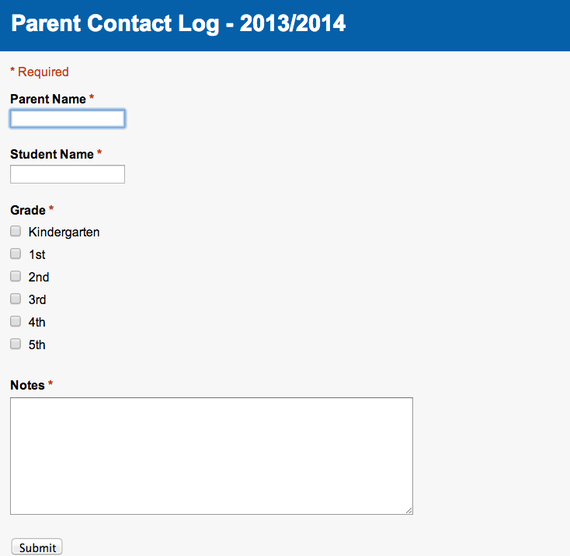 We had an assembly at my school today. If you’ve ever been to a school assembly, you know that it’s essential for the presenter to be able to manage the crowd, to get students back under control and focused after a joke, trick, or part of the presentation that causes (or tempts) students to talk. This morning I saw the presenter use an amazingly simple-yet-effective technique to keep the students focused and engaged. He called it “making a waterfall.” Here’s what he did. He told students that when they heard him say, “Waterfall,” they were to make a waterfall with their hands and fingers. Watch the short video below where I demonstrate what he did. If you’re an administrator who frequently speaks in front of an audience of students (especially at the elementary level), this might be something to try. If you’re a teacher, this might be a technique to use in the classroom to get students refocused after a group activity.
UPDATE: I used this technique two days later at grade-level awards assemblies, and it worked amazingly well (better than I even thought it would)! This is a keeper that I'll definitely be using in the future.
4 Comments
 If you've read my blog before, you know I'm a big fan of Google Forms. In this post, I want to share how I'm using this powerful tool to help me be more productive in the area of parent communication. This year, I have created a Google Form that I use as a Parent Contact Log. Each time I speak with a parent about a student or school-related issue, whether initiated by me or the parent, I document our conversation with this online form. The fields in my form include the date, parent's name, student's name, and a section for brief notes about our conversation (the form automatically time stamps each entry, but I manually enter the date of the conversation in case I make the entry at a later time). What I love about this form is that entries are automatically populated in a Google spreadsheet attached to the form. I could document these conversations in an old-school notebook, but by having all the entries in a spreadsheet, I can then sort conversations by parent, student, or date. I speak with a lot of parents, so having an easy-to-reference log of these conversations is extremely helpful. Below is a screenshot of the form I use. Whether you're a teacher or administrator, you know that speaking with parents is a common part of the job. If you're not already doing so, give Google Forms a try and see how they can help you be more productive. If you're not sure how to create a Google Form, you can easily learn how by watching my Google Forms tutorial videos.
 Well, it’s been a while. With my new position, I’ve had little extra time to blog. Shoot, I’ve had little extra time, period. But that’s a post for another day. While I typically write about teaching and educational technology, this post will be a little different. Consider it my attempt to discuss something close to my heart, to inform others about a common misconception. I like to be organized. For those who know me, that is not a surprising statement. A structured, organized environment contributes to my productiveness and peace of mind. My classroom was always this way. I didn’t like clutter, and everything had a spot. My bulletin boards and the student work displayed on them were always straight and level. I used to endure friendly ribbing for using a level to make sure my bulletin boards looked just right (which I thought was funny, because those who initially teased soon became the ones asking to borrow the level). Now that I’ve moved into administration, I like my office to be the same way – neat and organized, two things that help me be more productive. Over the past several years, when commenting on my neat classroom or office, I’ve had many, many people say things to me like: “Yeah, I have to be neat too. I’m totally OCD that way.” “I need to clean off my desk. My OCD is kicking in.” In our society, I think there’s a large misconception about OCD (Obsessive-Compulsive Disorder). It’s a term that gets casually thrown around without much thought being given to what it actually is, because most people don’t know what it really is. On the other hand, consider mental retardation (now referred to as intellectual disability). That’s a term that doesn’t get thrown around too often, because most people have a general idea of what it means. Think of it this way…If you made a mistake while completing a task, would you say, “I’m so retarded” to those around you? I don’t think so. Why not? Because you know what intellectual disability/mental retardation is, and you know you’re not a person who has that impairment. Plus, you know (hopefully) this is a comment that would be highly offensive to those individuals who do have this impairment, as well as to their families. So why then do people off-handedly say they have OCD, when chances are, they don’t? Wouldn’t this be offensive to those affected by OCD? So, what is OCD? Many use the term to describe people who like things neat and organized, but this is the misconception. Just because someone likes things to be tidy (even really, really tidy), it doesn’t mean he/she has OCD. OCD is an anxiety disorder. People who are affected by it are plagued by intrusive thoughts that produce uneasiness, apprehension, fear, or worry. They engage in repetitive behaviors aimed at reducing the associated fear or anxiety, even when the fear, anxiety, or behavior is irrational. Having OCD means so much more than being a “neat freak.” You see, I have a personal connection to this subject. I have a loved one who has been diagnosed with OCD. For several years, I have struggled to support this person who has suffered from crippling anxiety, fear, and worry. I’ve watched as the person’s mind gets “stuck,” obsessing about things that rationally don’t warrant that kind of worry, and feeling compelled to behave in ways that won’t take the worry away. I’ve seen how this disorder can absolutely paralyze a person. Thankfully, with prayer and the aide of family and an excellent therapist, my loved one has learned to manage OCD. So why did I write this post? To make anyone who has ever incorrectly used the term OCD feel guilty? Absolutely not. I’ve put my foot in my mouth, made comments without having all the facts more times than I want to admit. No, my goal is simply to educate, to let others know that OCD is more than a propensity for order and neatness. It’s something individuals and their families all over the world struggle with on a daily basis. I ask simply that we grant the disorder and the people it affects the respect they deserve. |
About BrentBrent has worked in the field of education as a teacher and administrator for 28 years. A former elementary school teacher and principal, he is currently Coordinator of Elementary Education in the Murrieta Valley Unified School District in Southern California. Read more about Brent here. Brent on X (Twitter)Archives
May 2024
Categories
All
|
Photos from somegeekintn, woodleywonderworks, Joybot, British Council Singapore, jseliger2, berkuspic, toddwendy, Alexandra E Rust, skippyjon, crdotx, tharrin, roybuloy, .FuturePresent., Just some dust, frankpierson, Jair Alcon Photography, Luigi Mengato, Muffet, stevendepolo, Pilar Soro, Sander van der Wel, jblyberg, jonathangarcia, DraXus, angeloangelo, Sthetic



 RSS Feed
RSS Feed
